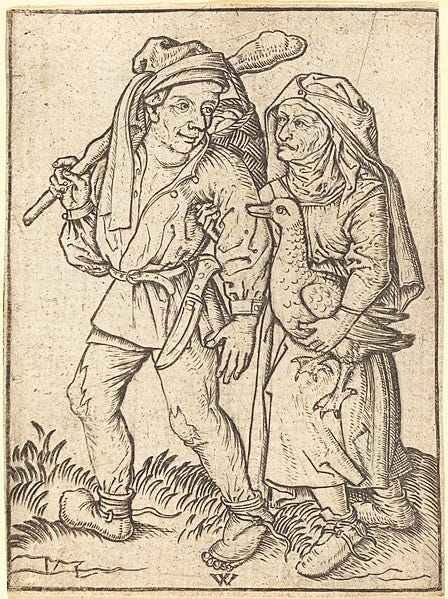Equals In Sin
Part Three of Feminism and the Church
I missed the Grammys over the weekend because I don’t care about that sort of thing, and because I was able to blissfully neglect the internet for a few minutes with a book. Later, as I was noodling around hoping to see what strange outfits had been strewn over our nation’s musical elite, I came across Billy Eilish’s hit song and was thereby reminded that I still haven’t made time to see the Barbie Movie. Goodness, I’m so backed up on everything.
Wenzel von Olmutz after Master of the Housebook, Farmer and his Wife with a Goose, 1490
As a salve to my conscience, I dutifully watched the Eilish music video and then went back to this other clip that was lost in the sea of more pressing news. Eilish’s song is called “What Was I Made For?” She breathily vocalizes as a young lady with extravagantly arranged blond hair in a yellow dress and yellow shoes—Barbie style I guess—sets out all the outfits for a Barbie doll on a mid-century modern desk. But then the wind blows, and the rain falls, and she has to pack it all back into its box and go away. Eilish says she didn’t know it when she wrote the song, but it was really about her. The second clip is of a similarly aged person, blond hair a wreck, weeping because she’s exhausted by her forty-hour work week and the fact that all the money she earns goes to rent. Towards the end, she cries, “I wasn’t made for this.”
The two are serendipitous for what I have been thinking about for this next installment on Feminism and the Church. The first two parts are here and here. In part one, I sketched out at least two different ways the word “feminism” can be heard. In the second, I remarked on the downfall of feminism when the advent of the pill came into common use.
Today I want to veer off the beaten path and spend some time in the wilds of the Middle Ages. Mary Harrington in the early part of Feminism Against Progress discusses two most useful terms—“economic sex” and “vernacular gender.” The two terms were coined by Ivan Illich in his book Gender. “For Illich,” writes Harrington, “‘vernacular gender’ was concerned not with the subordination of one sex to the other, but in ambiguous complementarity’ in which each depended on the other.” Economic sex, by contrast, Illich “characterizes as ‘the duality that stretches toward the illusory goal of economic, political, legal, or social equality between women and men.’” “Illich,” she goes on, “argues that in practice ‘sex’ is not less but more discriminatory towards women” than vernacular gender had been.
These two terms—vernacular gender and economic sex—are key for thinking about how women might live together with men in the church. I think they will provide us with a smoother path toward greater peace and happiness. For, if you stop and rewatch both of those two videos above, you will see that there is an unsettling contradiction at the heart of our modern/post-modern disenchantment.


